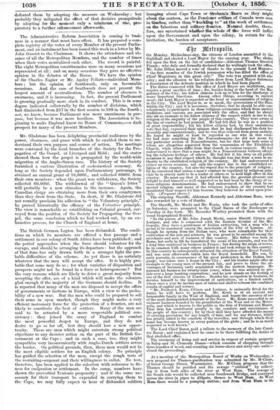The British German Legion has been disbanded. The condi- tions
on -which its members are offered a free passage and a settlement in our colony of South Africa have been published ; and the period approaches when the force should volunteer for the voyage, and should be arranging its departure : but the approach of that time has only drawn forth in a stronger light the pro- bable difficulties of the scheme. As yet there is no certainty whatever that the men will accept the offer. It is highly pro- bable that some may do so ; for what varieties of disposition and prospects might not be found in a force so heterogeneous? But the very reasons which are likely to deter a great majority from accepting the offer, are of a kind which will make the colonists glad enough if the majority of the Germans should decline. It is reported that many of the men are disposed to accept the offers of governments or factions in Europe, with a view to the proba- bility of a new war. But the men who could be prepared to sell their arms in open market, though they might make a very efficient mercenary force for the protection of a frontier, are not likely to constitute the best of settlers. Many of the men are said to be actuated by a more respectable political con- sistency: they joined the army of England to combat the most powerful despot in Europe, and they do not desire to go so far off, lest they should lose a new oppor- tunity. These are men which might entertain strong political objections to any decisive action on the part of the British Go- vernment at the Cape-; and in such a case, too, they might sympathize very inconveniently with Anglo-Dutel settlers across the border. On political grounds, then these men would not be the most eligible settlers for an English colony. No principle has guided the selection of the men except the rough tests of
i
the recruiting-sergeant and the willingness to enlist. No test, therefore, has been applied to the selection with reference to fit- ness for emigration or settlement. In the camp, numbers have shown the proverbial Teutonic propensity ; and if the sums ne- cessary for their transport be expended in carrying them to the Cape, we may fully expect to hear of disbanded soldiers lounging about Cape Town or araham's Sawn as they might about the canteen, as the Pensioner settlers of Canada were seen in Quebec, rather than*" imekrmg to" at the work of settlement on the laborious and solitary frontier. Natural doubts, there- fore, are entertained whether the 'wheat of ?tile force will inflict upon the Government and upon the colony, in return for the invitation, the burden of acceptance.


































 Previous page
Previous page